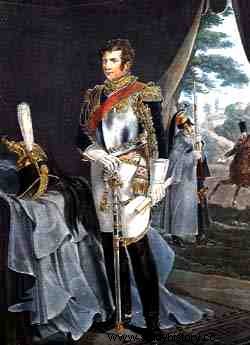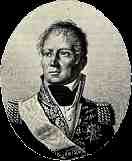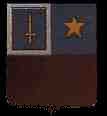May 13, 1764 (Toul) - March 17, 1830 (Hyères)
-

- Laurent, Marquis de Gouvion-St-Cyr
Laurent, Marquis de Gouvion-St-Cyr (born May 13, 1764 in Toul, died March 17, 1830 in Hyères), Marshal of the Empire and French politician.
Under the Revolution
After having dabbled in drawing and then in the theatre, Laurent Gouvion chose a career in arms and in 1789 entered the staff of the National Guard in Paris, thanks to his relative, field marshal Jean-Baptiste Gouvion, who was a major. general.
Volunteer on September 1, 1792 in the 1st battalion of republican hunters, he then added to his name to distinguish himself from the others that of Saint-Cyr, borne by his mother. He was captain, on November 1, deputy to General Léonard Honoré Gay de Vernon in February 1793, then battalion commander and chief of staff to General Ferey in September 1793. In the Army of the Rhine in various staffs , he had a dazzling career:brigadier general on June 5, 1794 and division general on June 11.
He was at the Blockade of Mainz (1795) under the orders of Jean-Charles Pichegru and Jean-Baptiste Kléber and organized the retreat and suffered a defeat on the Pfrimm in November 1794, but took Deux-Ponts on December 5, 1794. Commander of the left wing of the Army of the Rhine-and-Moselle, then the center.
-

- Laurent, Marquis de Gouvion-St-Cyr
Under the Management Board
In 1796, he fought at Rastadt, at Ettlingen, and took Stuttgart (July 18), then defended Kehl at the end of the year. Having replaced Hoche, deceased, at the head of the army of the Rhine-and-Moselle, he invaded the bishopric of Basel at the end of the year of 1797. Then Jean Marie Claude Alexandre Gouvion-Saint-Cyr then replaced Masséna at that of Rome from March 26 to July 25, 1798, was then suspended for abuse of power. He returned to Germany and commanded the left wing of the Army of the Danube, was in Stockach (March 25, 1799), then moved to the Army of Italy, governed Genoa and returned to the Army of the Rhine as Moreau's deputy. , won at Biberach (May 9, 1800).
Under the Consulate and the First Empire
But he does not get along with Moreau. So he asked for leave and Bonaparte, who did not like Moreau, appointed him State Councilor and sent him to command the Franco-Spanish armies during the Portuguese War (1801). Ambassador in Madrid (1801) alongside Lucien Bonaparte, Gouvion then commanded the army of Naples. For not having expressed his adhesion to the Empire, he is eliminated from the list of marshals. In 1805, he was in Italy and remained there at the head of the army of Naples. From late 1806 to August 1808, he was relegated to command of the Boulogne camp. In May 1808, he was made count of the Empire and sent to Catalonia in August.
A remarkable tactician, Gouvion won several victories and unblocked Barcelona. Having refused to carry out the impracticable order to besiege Verona, Tarragona and Tortosa simultaneously, he was replaced by Augereau and left his post before the latter arrived. Arrested, Gouvion remained on the sidelines until 1811, when he was reinstated in the Council of State. He commanded the 6th corps of the Grande Armée during the Russian campaign, was victorious but seriously wounded at Polotsk, (August 18, 1812), and finally raised to the dignity of Marshal of the Empire, as his harshness and lack of sociability had prevented him from getting that far. In August 1813, he defended Dresden and fell into the hands of the Austrians when the city capitulated. Having hardly had to praise the Emperor, he did not join him during the Hundred Days. Upon his return, Louis XVIII made him Minister of War (July-September 1815), then Marquis de Gouvion-Saint-Cyr
Under the Restoration
He will have the portfolio of the Navy then that of the War of 1817 to 1819, will reorganize the army in a remarkable way and will leave his name to the law on recruitment. He was made marquis in 1817. The name of Gouvion-Saint-Cyr is engraved on the Arc de Triomphe de l'Étoile.
-

- Weapons of Gouvion
